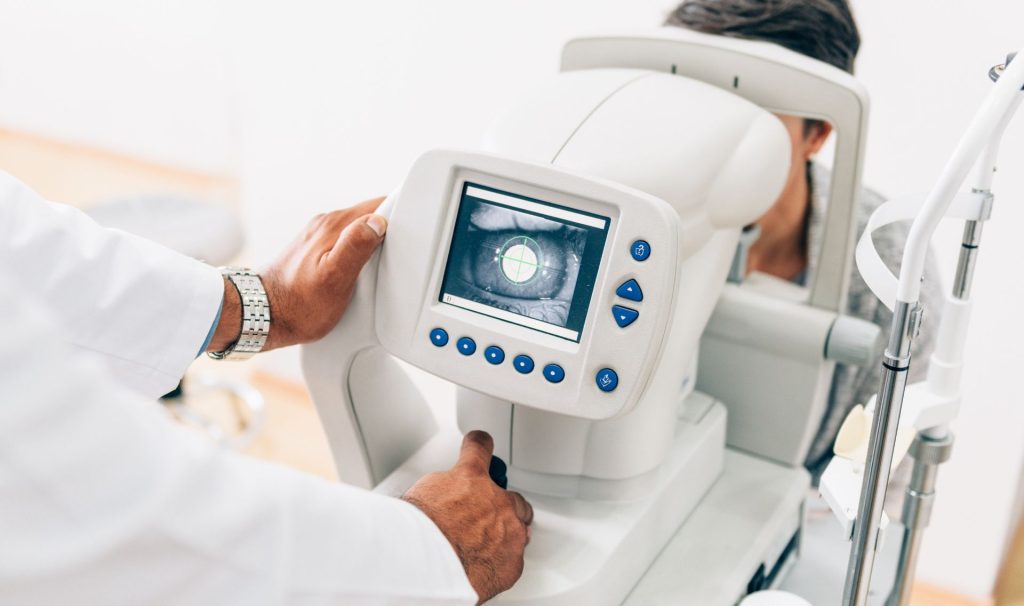Chronic diseases
Several chronic diseases can affect the health of your eyes, including diabetes, glaucoma, chronic eyelid inflammation and macular degeneration. Ensuring that you go for routine eye exams will help detect these conditions early and prevent extensive damage. If you are diagnosed with a chronic disease impacting your vision, ensure that you continue to have regular eye checks to monitor its progress.


Diabetic Retinopathy
Both type 1 and type 2 diabetes can cause eye problems. One out of three people with diabetes is prone to diabetic retinopathy, whereby the blood vessels in the retina are damaged. As a result, you may experience seeing dark spots cloud your vision, experience vision loss or struggle to read and focus.
Should your condition worsen, your diabetic retinopathy could extend to proliferative diabetic retinopathy, a severe condition in which new blood vessels grow on the retina that can leak and cause scarring leading to total vision loss.
As someone living with diabetes, you are also more prone to diseases such as cataracts, glaucoma and macular oedema – all conditions affecting your eyesight and health.
Treatment for diabetic retinopathy
It’s essential for people with diabetes to live a consistently healthy lifestyle and do routine check-ups with their doctors, including the Optometrist. By maintaining your blood sugar levels, you can avoid risking the health of your eyes, and with consistent evaluations, your Optometrist will be able to identify any issues early on.
Proliferative retinopathy can be reversed if caught early enough. However, the procedure to diagnose proliferative retinopathy will require an invasive surgery whereby the new blood vessels are shrunken down with a laser. Alternatively, you may require more extensive surgery to repair your retina or macular. Our Optometrists have years of experience treating patients, and our modern technology allows for seamless procedures.
Glaucoma
Glaucoma is a series of eye diseases that target the optic nerve, causing blindness. It is most common in patients over 60 but can appear at any age.
Glaucoma is characterised by fluid pressure building behind the eye known as Intraocular Pressure (IOP). Aqueous fluid produced behind the eye is transferred to the front of the eye before leaving through pathways in the iris and cornea. If these pathways are obstructed, it causes the IOP to build and harm the optic nerve, eventually leading to impaired vision.
There are five main types of glaucoma:
- Angle-closure or acute
- Open-angle or chronic
- Congenital
- Normal-tension
- Secondary
The signs of glaucoma differ depending on the type, but general symptoms include:
- Severe headaches
- Blotchy spots clouding vision
- Eye pain
- Eye redness
- Nausea
- Vision loss
The symptoms of glaucoma are slow to develop and difficult to detect until the condition is quite severe; however, our advanced testing allows us to screen for all forms of glaucoma and act accordingly.
Treatment for glaucoma
Treatments for glaucoma work to reduce the IOP inside the eye, either through medication such as pills or eye drops, or surgery will need to be performed to drain the fluid build-up. After assessing the severity of your glaucoma, our Optometrist will advise you on the best course of treatment for your specific condition and comfort.
Blepharitis
Blepharitis is a condition that causes the eyelids to become inflamed. It can affect both the outer and interior areas of the eyelid but is most common along the edge. The most common cause of blepharitis is clogged oil glands, but other conditions that cause inflammation are allergies, infection, rosacea and seborrheic dermatitis.
While it’s typically easy to spot blepharitis due to the inflamed appearance of the eyelid, there are other symptoms to look out for:
- Fluid or discharge leaking from the eye
- Crust forming along the edge of the eyelid and in the corner of the eyes
- Blurry vision
- Eye pain or itchiness
Treatment for blepharitis
We are trained to diagnose and treat blepharitis effectively with medications that will reduce the inflammation and restore the health of the eyelid. Upon a diagnosis, our Optometrist will advise the best course of action.
Macular Degeneration
The macular is the part of the retina responsible for sharp vision. Unfortunately, as we age, our macular tends to deteriorate in a condition known as age-related macular degeneration, leading to blurred vision that eventually worsens over time.
Symptoms of macular degeneration often present as mild vision issues over time, so it’s crucial to go for recurring comprehensive eye examinations every one to two years once you reach the age of 40.
Things to look out for:
- Difficulty seeing in dim lighting
- Blurred vision
- Lines and faces appear distorted
- Poor colour vision
Treatment for macular degeneration
While there is no cure for macular degeneration, leading a healthy lifestyle is key to prevention. Our Optometrists will perform tests to check whether the macular is still healthy and suggest ways to prevent any deterioration.
Should you be diagnosed with macular degeneration, our Optometrist may prescribe certain medications or eye vitamins to slow the condition’s progression.